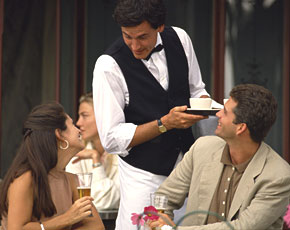
Dining dilemmas
Whether you're braaiing, or meeting at your local pizzeria, mealtime manners are a must.
Eating in
It is polite to offer to take something if you have been invited over for a meal. You might be asked to bring your own drinks, for instance. If your hosts will be supplying everything, take a present, like chocolates or a bouquet of flowers.
If you are attending a sit-down meal, arrive at the host's house punctually. The cook won't thank you if you ruin a delicate soufflé by turning up late. If you are delayed, phone the host as soon as possible, so that they don't hold dinner back for you.
Remember to phone afterwards to thank your hosts for the evening. They will appreciate it, even if they don't expect it.
Eating out
If you are eating out with a group of people, decide in advance whether you want to split the bill or pay your individual shares separately. This will prevent those awkward situations when you're left feeling that you paid for someone else to eat lobster while you had salad!
When it comes to ordering wine, the one who orders should taste it. If your waiter presents you with the cork, don't smell it – you are supposed to check it for damage. Nowadays you can drink red or white wine with any dish, but red wine is often drunk with strong-flavoured dishes like game or red meat.
Men and women
Now that women work, drive and have the vote, Victorian-style manners have changed. Many women no longer expect men to open doors for them, but won't object if they do. In general, whoever reaches a door first should open it. The same applies to entering or leaving a lift. In the case of car trips, it's not necessary for the driver to hold open the car door for passengers.
Money matters are trickier. In general, the man is expected to pay on a first date, but couples are often more comfortable going Dutch after that. However, because men often date women who are younger than they are and may not earn as much as they do, this is open to negotiation.
Mind your language
What you say and how you say it makes an important impression on others. Swearing is still a no-no, and it is polite to use 'please' and 'thank you'. When phoning someone, remember to tell them who you are before you start to talk to them – you know who you phoned, but they don't necessarily know you! The same goes for answering the phone: if you tell the caller who they are talking to, you can avoid those confusing, mistaken-identity calls.
In a multilingual country like South Africa, your language choice is also important. In a group of people with different first languages, it is rude to speak in a language that others do not understand and it may backfire on you too. For example, two women broke into Afrikaans in front of a couple on discovering that the wife was American. Her South African-born husband later translated the conversation: the two had been gossiping about how little make-up she was wearing!
Cellphones
The key to using a mobile phone in public is to be discreet. Avoid making calls in public or when you are talking to others and excuse yourself if you receive a call. Peter Laufer, the author of Wireless Etiquette: A Guide to the Changing World of Instant Communication (Branden), suggests that you set your phone to vibrate instead of ring, speak softly and keep conversations short. He also adds that you are free to ignore a ringing cellphone – that is what voice mail is for.
Netiquette
As more and more people use e-mail and the Internet, Web etiquette (called netiquette) has developed.
- Don't type your entire e-mail message in capital letters. This is the telephone equivalent of shouting.
- Don't e-mail thank-you letters. A written letter or a phone call are still the only acceptable forms.
Show them the money!
Most of us know when we are required to tip someone, but may be uncertain how much money to give. Here are a few tipping guidelines:
- petrol/parking attendants: tip 50c to R2.
- waitrons: 10 percent of the bill, unless a service charge is included in the bill.
- hairdressers: R5 to R20 for the shampooist, and five to 10 percent of the bill for your stylist or colourist. If your stylist is also the owner of the salon, you can choose not to tip.
- takeaway delivery men: tip 10 percent of the cost of the takeaway, or a little less.




 Publications
Publications
 Partners
Partners









